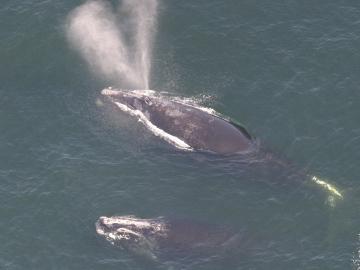
Caption
A pair of North Atlantic right whales surface. The endangered whale species travels to coastal Georgia waters during the cooler months to calve.
Credit: National Oceanic and Atmospheric Administration

A pair of North Atlantic right whales surface. The endangered whale species travels to coastal Georgia waters during the cooler months to calve.
This year's North Atlantic right whale calving season has ended with 15 calves spotted off the Georgia, Florida and Carolina coasts.
Georgia Department of Natural Resources wildlife biologist Clay George calls that a lackluster, below-average season.
With fewer than 350 of the highly endangered whales in existence, the species could be on an extinction track if nothing changes, he said.
"The models suggest if we're able to somehow eliminate human causes of mortality and injury, even at modest calving rates, the species would stabilize and persist," he said. "And if calving could increase, the species could continue to grow."
Almost all right whale death and injuries are caused by fishing rope entanglements and vessel strikes.
Technology is being developed to prevent those deaths, George said, but it's costly and could take years to implement.
"A number of different fishermen are working with different companies, academics, and researchers to figure out ways to keep the rope down on the bottom most of the time and then use acoustic signals to call the buoy rope back to the surface when they need it," he said. "And that way, the rope isn't in the water column where whales can become entangled."
According to George, if we don’t address human impacts, especially fishing rope entanglement in New England and Canada, the species could be functionally extinct in a few decades.
